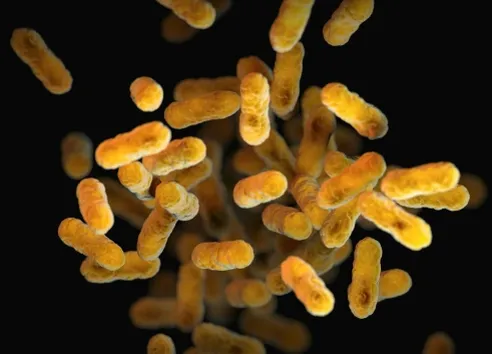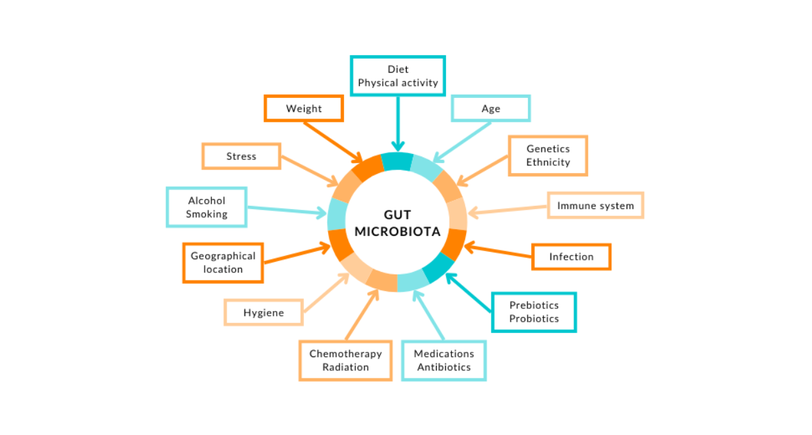Microbiome and breast cancer.
What is the link?

Is there a link between the gut microbiome and breast cancer?
Many studies have looked at the gut microbiome and breast cancer risk, showing that changes or an imbalance in gut microbes are linked to a higher risk of breast cancer. Changes in your gut microbiota can influence health, especially if there is an imbalance in the different types of microbes.
These changes can contribute to a range of illnesses such as irritable bowel syndrome (IBS), obesity, depression, asthma, as well as some cancers.
Tips for improving the health of your microbiome.
Focus on fibre.
Eat plenty of high-fibre foods, such as fruits, vegetables, legumes, wholegrains and nuts.
Boost with probiotics.
Add probiotics (live microorganisms) and fermented foods to your diet.
Maintain a healthy weight and keep moving.
Focus on achieving and maintaining a healthy body weight for your height. Keep active with a regular mix of different types of physical activity.
Key facts about the microbiome and breast cancer risk.
- The microbiome is an ecosystem (a biological community) that groups both the microorganisms (the microbiota) and their surroundings, which can be found in different parts of the body, like the gut, breast, skin or mouth.
- The gut microbiome is the largest in the human body and plays a key role in human health.
- An imbalance in the gut microbiome can increase the risk of breast cancer.
- Other microbiomes (breast, skin or mouth) may also influence breast cancer risk, but more research is needed.
How does the gut microbiome increase breast cancer risk?
There are different ways the gut microbiome can affect breast cancer risk:
- Oestrogen production – some gut microbes can increase the amount of oestrogen in the body which can increase the risk of breast cancer [4].
- Microbial products (substances made by our gut microbes when the body breaks down food, drugs or chemicals) – gut microbes can produce some cancer-protective substances [3].
- DNA damage – some gut microbes can damage DNA which can promote breast cancer [3].
- Immunity and inflammation – Negative changes to the gut microbiome can lead to long-term inflammation, which can increase the risk of breast cancer [5].
- Overweight and obesity – an imbalance in gut microbes can lead to weight gain and obesity, which in turn can increase the risk of breast cancer in post-menopausal women and in men [3,5].

Ask the scientist: How does your gut microbiome increase breast cancer risk?
Have any other microbiomes been linked to breast cancer?
Other microbiomes, including the breast, mouth, and skin microbiomes, may have a link to breast cancer risk. However, more research is needed to confirm whether there is a connection between changes in these microbiomes and the risk of breast cancer.
What is the gut microbiome and what does it do?
The gut microbiome is all the microbes and their genes found in your stomach, intestine and colon. It is the largest and most diverse microbiome in the human body [2].
Your gut and the microbes that live there help each other out. Your gut provides a nutrient-rich environment for the microbes, and in return, the microbes perform essential functions for your body.
Some of these functions include supporting your immunity by strengthening the lining of your stomach and intestine, aiding digestion, or helping produce essential vitamins and hormones [2].
Factors that influence the gut microbiota.
What can affect and change your gut microbiome?
Many factors can influence your gut microbes, some that you can’t change and others that you can.
The factors you can’t change include age, ethnicity, genetics, hormonal levels and how you were delivered as a baby.
The factors you can change include diet, prebiotics (fibres that feed the microbiota), probiotics (foods that naturally contain microbes, or supplement pills that contain live active microbes), stress, hygiene, alcohol, smoking, antibiotic use, chemotherapy, and radiation [3].
Start your prevention journey today.
Stop ignoring your gut feelings—literally. A healthy gut microbiome is your secret weapon for better health and more energy. Don't wait. Take one action today:
- Swap your soda for a kombucha.
- add some kefir to your breakfast.
- or simply eat one extra serving of veggies.
Remember, these small steps can make a big difference. Your future self will thank you.
Further reading
For more information, read our Microbiome and Breast Cancer science review.
Last review: Aug-24 | Next review: Aug-27.
-
- Berg G, Rybakova D, Fischer D, Cernava T, Vergès MCC, Charles T, et al. Microbiome definition re-visited: old concepts and new challenges. Microbiome 2020;8:1–22. https://doi.org/10.1186/S40168-020-00875-0.
- Selvakumar D, Evans D, Coyte KZ, McLaughlin J, Brass A, Hancock L, et al. Understanding the development and function of the gut microbiota in health and inflammation. Frontline Gastroenterol 2022;13:e13–21. https://doi.org/10.1136/flgastro-2022-102119.
- Ruo SW, Alkayyali T, Win M, Tara A, Joseph C, Kannan A, et al. Role of Gut Microbiota Dysbiosis in Breast Cancer and Novel Approaches in Prevention, Diagnosis, and Treatment. Cureus 2021;13. https://doi.org/10.7759/cureus.17472.
- Parida S, Sharma D. The Microbiome–Estrogen Connection and Breast Cancer Risk. Cells 2019;8. https://doi.org/10.3390/cells8121642.
- Fernández MF, Reina-Pérez I, Astorga JM, Rodríguez-Carrillo A, Plaza-Díaz J, Fontana L. Breast Cancer and Its Relationship with the Microbiota. Int J Environ Res Public Health 2018;15. https://doi.org/10.3390/ijerph15081747.


